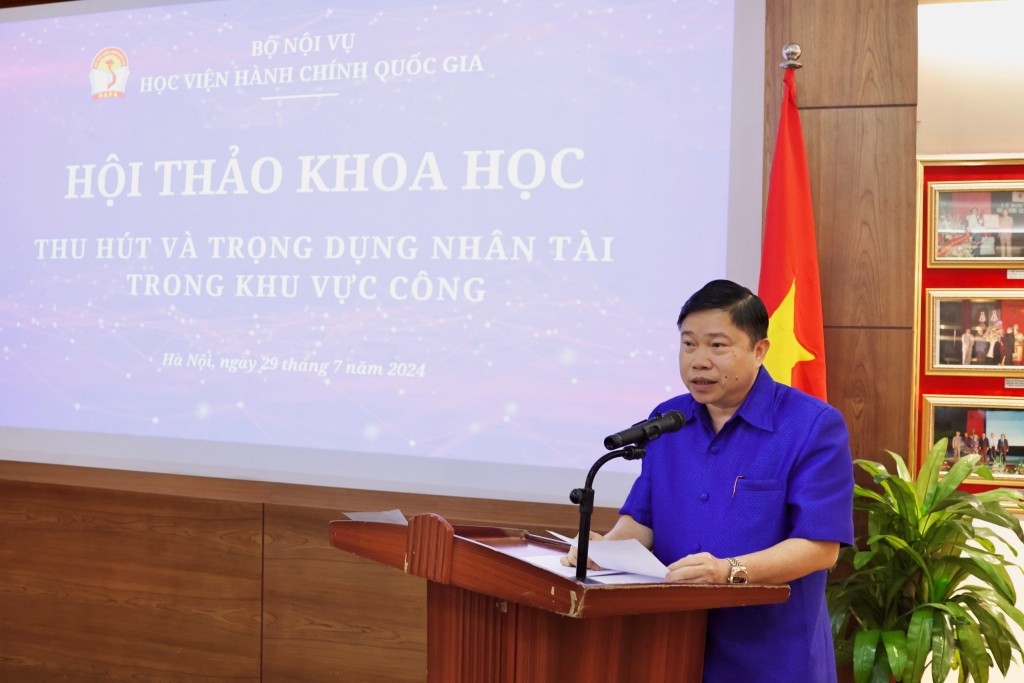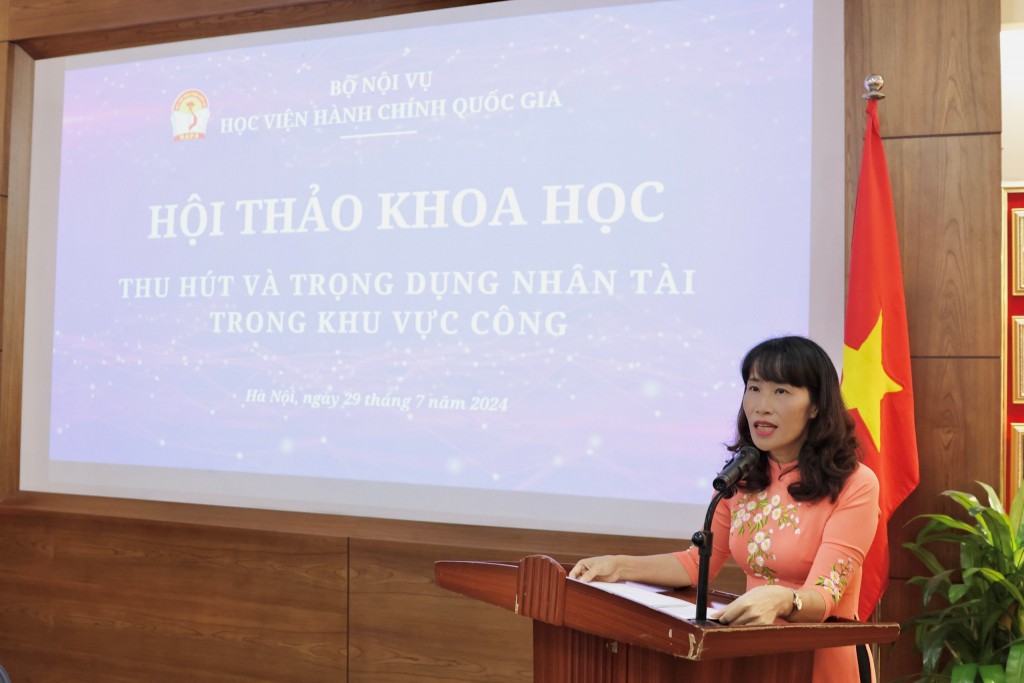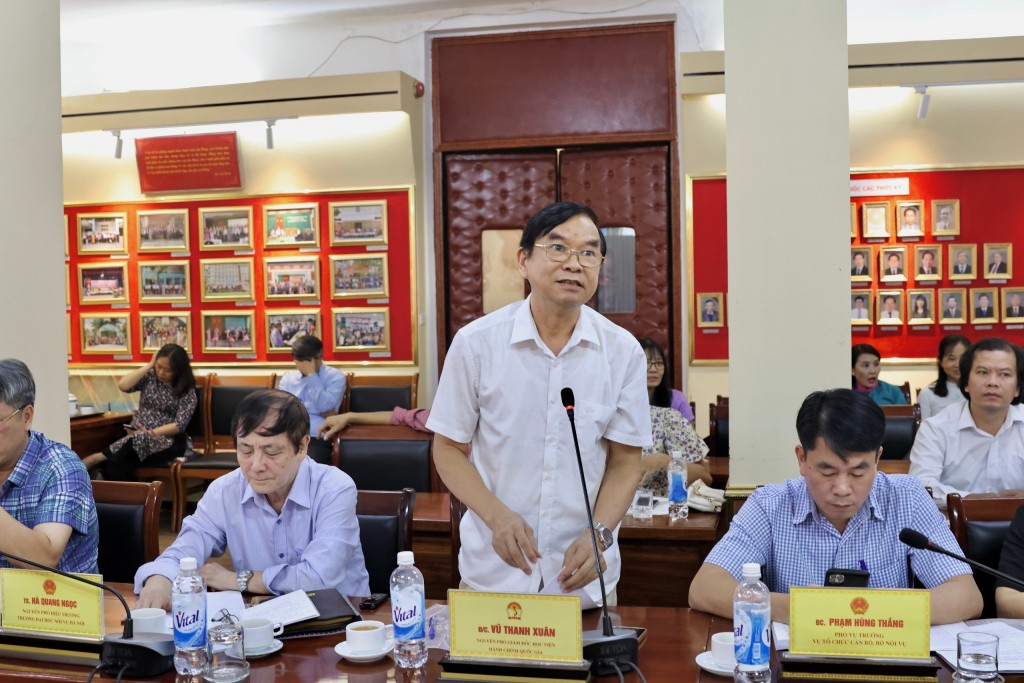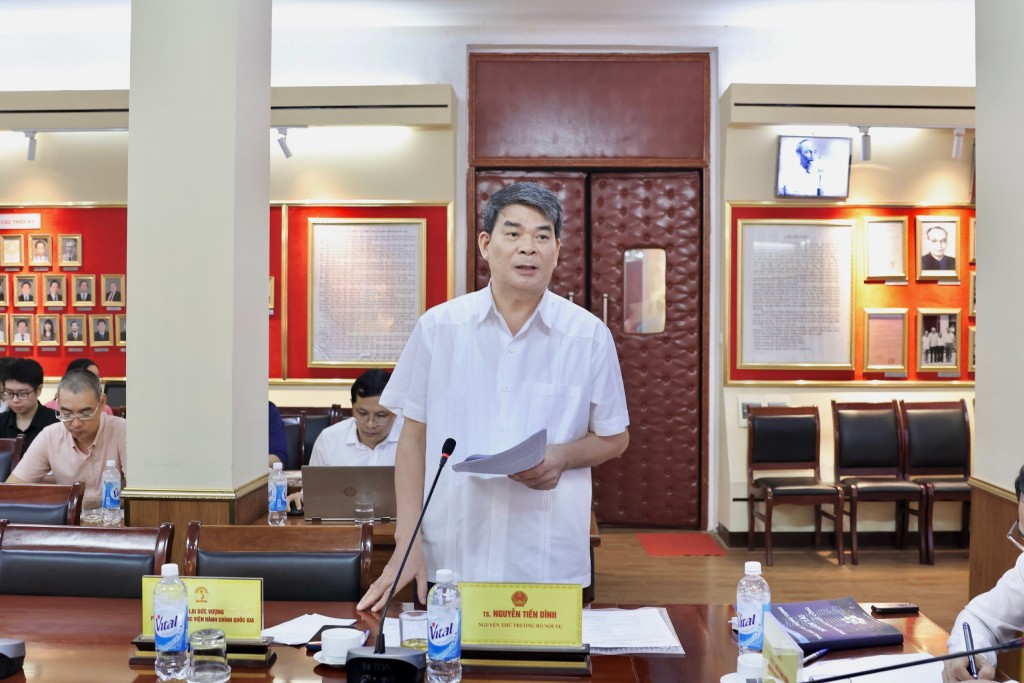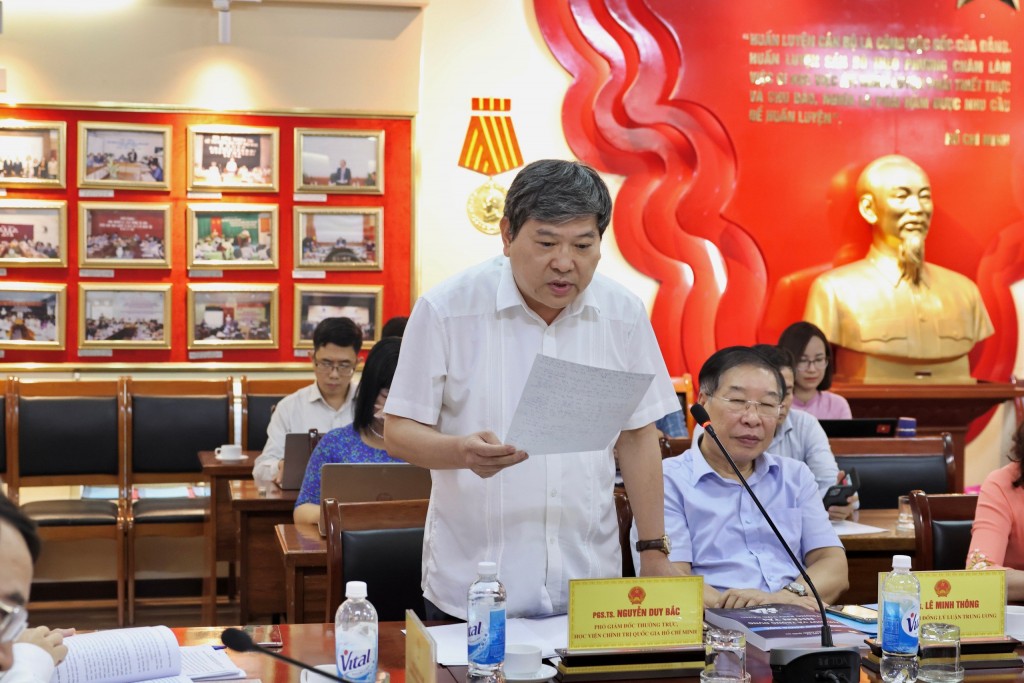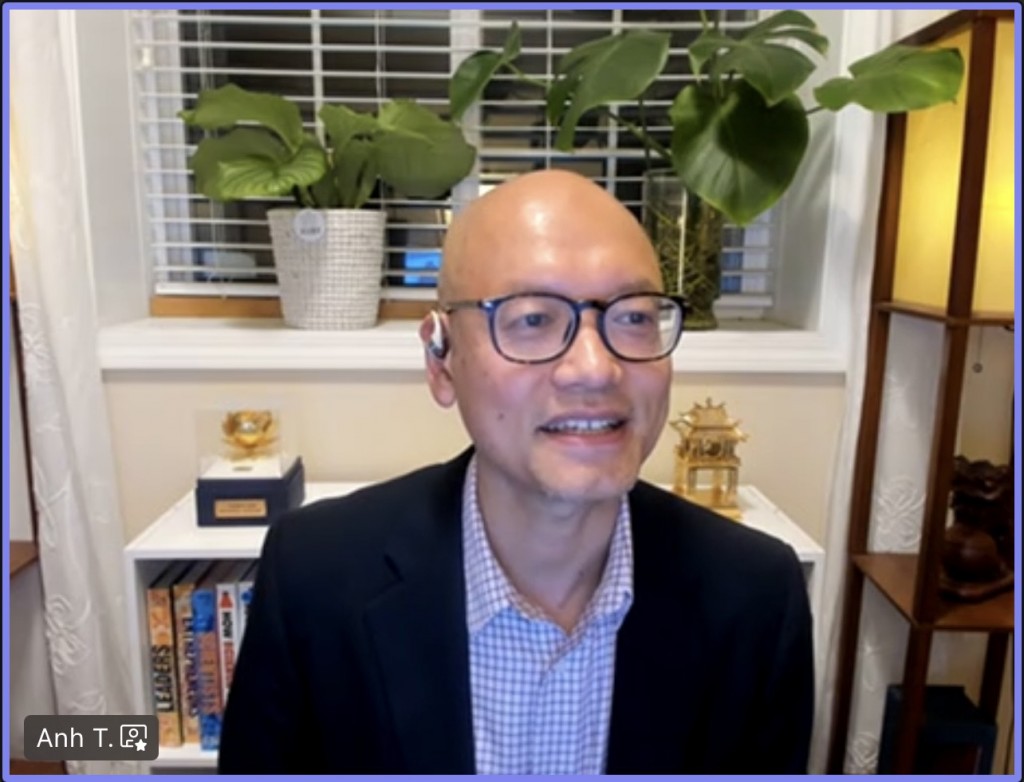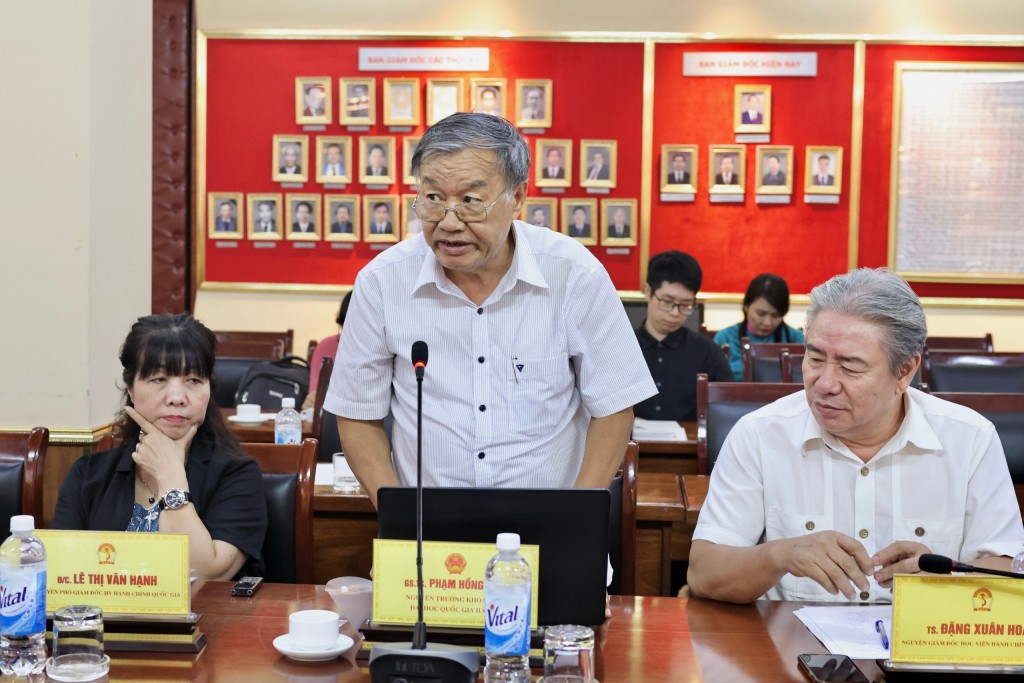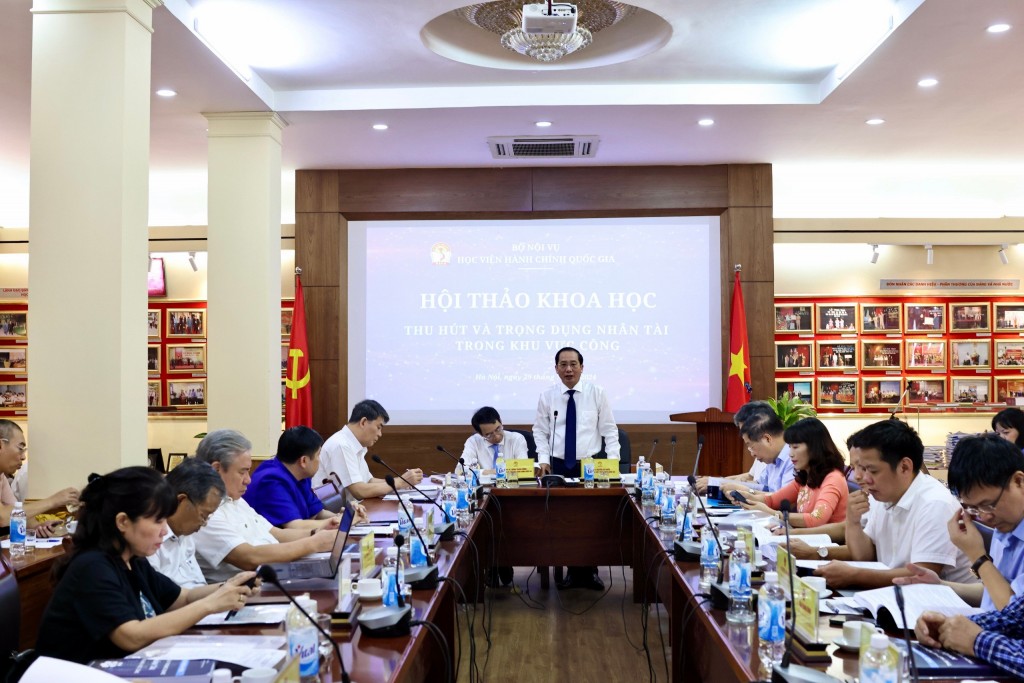On July 29, 2024, in Ha Noi, the National Academy of Public Administration (NAPA) organized a workshop on “Attracting and Utilizing Talent in the Public Sector.” The workshop was conducted both in-person and online.
Assoc. Prof. Dr. Nguyen Ba Chien, NAPA President, and Assoc. Prof. Dr. Luong Thanh Cuong, NAPA Vice President, co-chaired the workshop.
Participants included representatives from various ministries, sectors, and localities: Assoc. Prof. Dr. Nguyen Duy Bac, Permanent Vice President of the Ho Chi Minh National Academy of Politics (HCMA); Prof. Dr. Le Minh Thong, Member of the Central Council on Theoretical Studies, former Assistant to the Chairman of the National Assembly; Assoc. Prof. Dr. Hoang Van Nghia, General Director of the International Cooperation Department, HCMA; Dr. Nguyen Hai Long, General Director of the Commission on Delegate Affairs, Office of the National Assembly; Assoc. Prof. Dr. Nguyen Tuan Hung, Deputy Director General of the Department of Organization and Personnel, Ministry of Health; Dr. Dang Phuong Nga, Deputy Director General of the Department of Organization and Personnel, Ministry of Culture, Sports, and Tourism; Dr. Tran Thanh Binh, former Deputy Director General of the Department of Organization and Personnel, Central Party Commission for Organization; Prof. Dr. Pham Hong Thai, Viet Nam National University, Hanoi; Mr. Ngo Duc Thinh, Director of the Department of Home Affairs of Phu Tho Province; Mr. Vu Manh Hung, Director of the Department of Home Affairs of Bac Giang Province.
Representing the Ministry of Home Affairs (MoHA) were Dr. Nguyen Tien Dinh, former Vice Minister of MoHA; Mr. Pham Hung Thang, Deputy Director General of the Department of Organization and Personnel; Mr. Nguyen Tu Long, Deputy Director General of the Department of Civil Servants and Public Employees; Dr. Tran Nghi, Editor-in-Chief of the State Organization Magazine; Dr. Nguyen Ngoc Van, former Director of the Institute for State Organizational Sciences.
The workshop also featured the participation of former leaders of NAPA, including Dr. Dang Xuan Hoan, former NAPA President; Assoc. Prof. Dr. Le Thi Van Hanh, former NAPA Vice President; Dr. Vu Thanh Xuan, former NAPA Vice President; Dr. Ha Quang Ngoc, former Vice Rector of the Hanoi University of Home Affairs.
In addition to the distinguished delegates attending in person, the workshop featured participation from researchers and managers attending online, including Prof. Dr. Tran Ngoc Anh from Indiana University, USA; Dr. Nguyen Dang Que, NAPA Vice President, and representatives from the Departments of Home Affairs of Bac Giang, Ha Nam, and Hai Phong provinces, as well as NAPA campuses.
The workshop was also attended by leaders of various units, faculty members, and guests from both within and outside NAPA.
In his opening remarks, Assoc. Prof. Dr. Nguyen Ba Chien, NAPA President, emphasized that talent is a critical resource in the country’s development process. Therefore, the discovery, recommendation, attraction, and utilization of talent have always been of great concern to the Party and the State of Viet Nam. Ministries, sectors, and localities have implemented specific policies to attract talent. However, in the face of increasing demands and the fierce competition between the public and private sectors, it is crucial and necessary to establish timely and appropriate policies to attract and utilize talent in the current phase.
The workshop aims to gather opinions and discussions to clarify issues related to the attraction and utilization of talent, such as: (1) The views of the Party, the State, and theoretical issues on attracting and utilizing talent in the public sector; (2) Current practices in attracting and utilizing talent in ministries, sectors, and localities in Viet Nam; (3) Historical and international experiences in attracting and utilizing talent; (4) Proposals for solutions to attract and utilize talent in the public sector in Viet Nam.
In her remarks, Assoc. Prof. Dr. Hoang Mai, Dean of the Faculty of Human Resource Management, affirmed that attracting and utilizing talent in the public sector has always been a topic of concern, especially in the context that Viet Nam needs to effectively implement the tasks and solutions outlined in the National Strategy on Talent Attraction and Utilization by 2030, with a vision to 2050, as per the Prime Minister’s Decision No. 899/QĐ-TTg dated July 31, 2023, and the completion of the draft Decree on policies for attracting and utilizing talented individuals into state administrative agencies and public service units.
The workshop on “Attracting and Utilizing Talent in the Public Sector” aims to promote academic research, training, and policy recommendations, along with practical solutions to attract and utilize talent in the public sector effectively and efficiently. It also encourages researchers and delegates to share practical experiences and propose scientific solutions and policy implications to enhance the effectiveness of attracting and utilizing talent in the public sector in the new context.
Dr. Vu Thanh Xuan, former NAPA President, delivered a presentation at the workshop, covering topics such as: identifying the public sector and talent within it; the necessity of attracting and utilizing talent in the public sector; and several solutions for attracting and utilizing talent.
According to Dr. Vu Thanh Xuan, discussing talent not only addresses an important issue and task of the public sector but also refers to a valuable tradition of the nation, which has been affirmed, honored, and developed. Dr. Vu Thanh Xuan proposed five solutions to attract and utilize talent in the public sector: (1) innovating the mindset regarding talent; (2) building and perfecting institutions and laws related to talent; (3) establishing outstanding policies for talent; (4) creating a professional working environment that is attractive to talent; (5) fostering a tradition of patriotism, national pride, and a sense of responsibility towards the country among all Vietnamese people, especially talented individuals.
At the workshop, Dr. Nguyen Tien Dinh, former MoHA Vice Minister, presented a paper titled “The Current State and Solutions for Attracting Talent in the Public Sector in Viet Nam Today.” He emphasized that talent is a special resource and a crucial factor in the development of the country. Throughout the nation’s history, in various eras, there has been a consistent effort to train, search for, discover, attract, and utilize talent. President Ho Chi Minh exemplified the model for training, attracting, and utilizing talent in Viet Nam. Since its establishment, the Party of Viet Nam has always aimed to improve the quality of human resources, especially talent in strategic fields. The State has issued numerous mechanisms and policies to attract talent and has achieved positive results. However, compared to the requirements for the country’s development in the new situation, the State must improve stronger mechanisms and policies and implement other measures to enhance the effectiveness of attracting and utilizing talent.
According to Dr. Nguyen Tien Dinh, the current situation of attracting and utilizing talent has several issues, such as: the number of attracted talents is not large; the number of people remaining to work in the public sector is low; many employees in state agencies and public non-business units are resigning to work in the private sector; the number of outstanding students with notable achievements attracted is still small; the content and methods of training remain traditional and not modern; there is a lack of attention to fields like scientific and technical research and management sciences. The causes of these issues include inadequate identification of talent for attracting and utilizing measures; inconsistent policies and measures; insufficient importance placed on the use and utilization of talent—meaning that there should be greater attention to this aspect; limited working environment; pressure that does not allow for creativity for talented individuals; incorrect perceptions among talented individuals; and a lack of commitment and contribution to the agency or collective.
He proposed several solutions, including achieving high consensus on identifying talented individuals to attract and utilize them in the public sector; having a strategy and implementing good mechanisms and policies to attract and utilize talent; and increasing the responsibility of all levels and sectors, especially the leaders of agencies and units, in attracting and utilizing talented individuals.
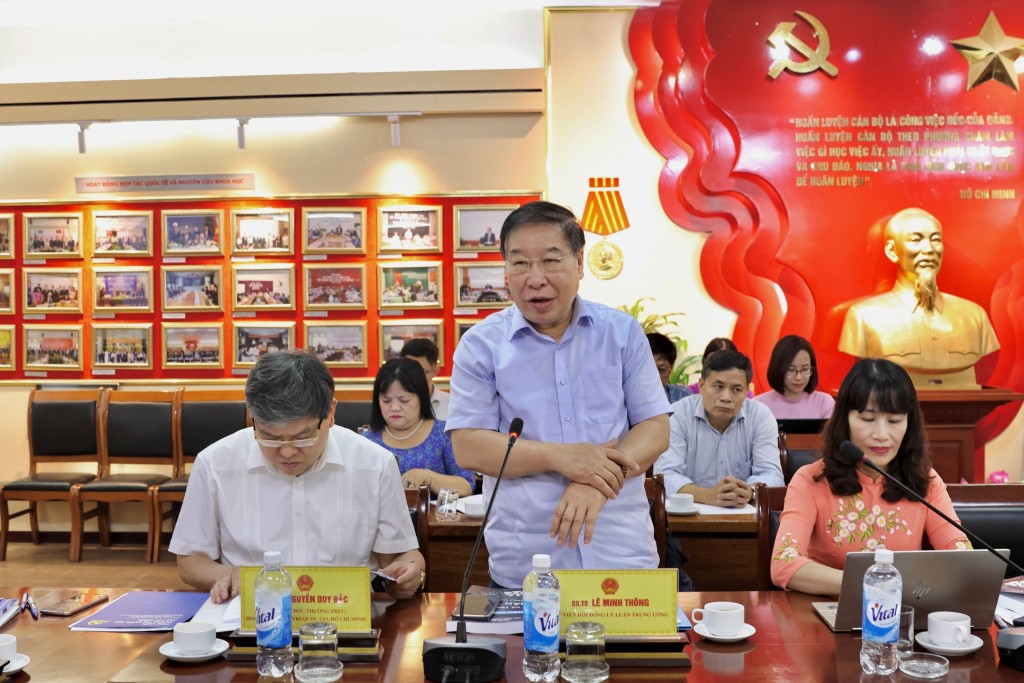
Prof. Dr. Le Minh Thong, Member of the Central Council on Theoretical Studies, former Assistant to the Chairman of the National Assembly, at the workshop.
According to Prof. Dr. Le Minh Thong, it is essential to change the mindset and build a truly elite, professional, loyal team with high expertise capable of addressing emerging issues. He proposed five solutions:
(1) Elevating the Public Sector’s Reputation: Restoring the prestige of the public sector in the eyes of society, creating a sense of honor associated with working in the public sector. This entails raising the public sector’s reputation to counter the appeal of the private and foreign sectors. To achieve this, a strong shift from administrative reform to national governance is needed.
(2) Freeing Up Workspaces and Downsizing Staff: There should be decisive measures to downsize staff and eliminate underperforming individuals. This includes policies to support those who are no longer suitable for public service roles in finding alternative livelihoods.
(3) Reforming Administrative Procedures: Simplifying the procedures for recruiting talented individuals. The process of hiring public servants should be less stringent. Continuous evaluations should be conducted daily, monthly, and annually, with a focus on assessing public servants based on their performance and contributions rather than lifetime employment guarantees.
(4) Creating a Seamless Public-Private Interface: Simplifying procedures to attract talent from the private sector to the public sector. This requires fostering a dynamic public service environment and organizing work in a project-based, teamwork-oriented manner rather than a traditional departmental structure.
(5) Improving Income Levels: Public servants should attain middle-class status, ensuring a decent standard of living.
Assoc. Prof. Dr. Nguyen Duy Bac, Permanent Vice President of the Ho Chi Minh National Academy of Politics highlighted that while the Party and State of Viet Nam have implemented numerous solutions to attract and utilize talent with notable results, there are still limitations in policies related to attracting, using, and retaining talent. The involvement of leaders, agencies, and organizations in this work has not been proactive enough, and psychological and perceptual barriers, market mechanism competition, and the diminishing appeal of public sector positions have all contributed to the current challenges.
To address these limitations, attracting and utilizing talent requires the participation of various levels and sectors, including the home affairs sector and the education sector. With their assigned functions and tasks, HCMA and NAPA must excel in training talent within the public sector. This involves updating curricula, enhancing the skills and capabilities of learners to better serve public duties, and collaborating with Party and State agencies to recommend and introduce capable and talented individuals who can contribute to the nation. Special emphasis should be placed on the role of higher education in identifying talent. Identifying talent at the university level is crucial, with measures such as appointing them to leadership and management positions, utilizing and rewarding talented individuals as experts, and integrating them into key scientific roles.
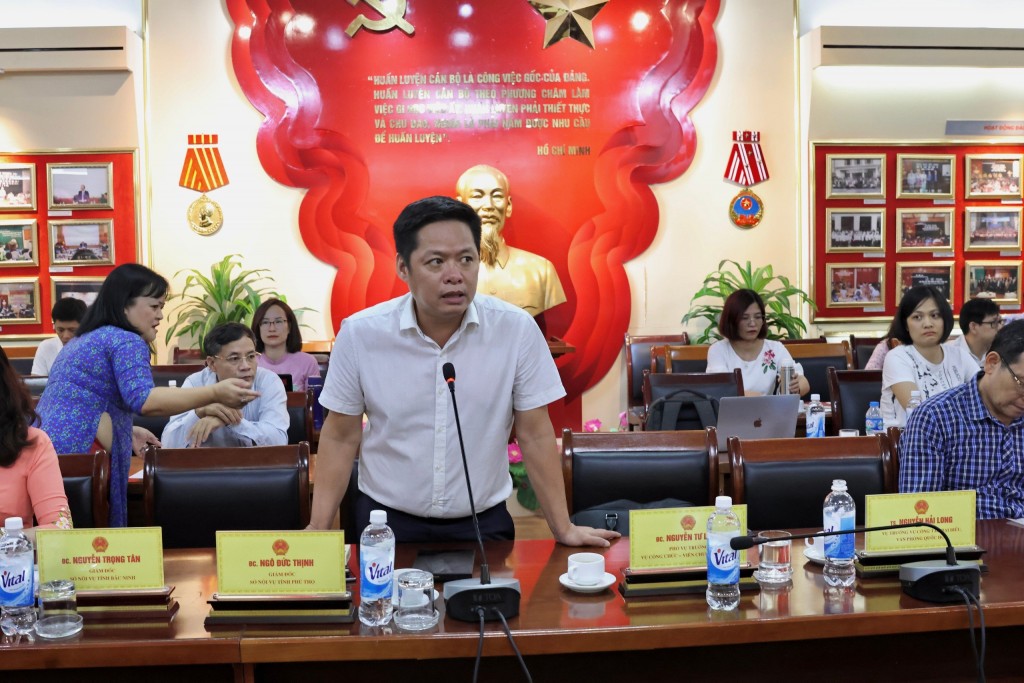
Mr. Nguyen Tu Long, Deputy Director General of the Department of Civil Servants and Public Employees, MoHA, at the workshop.
Mr. Nguyen Tu Long, Deputy Director General of the Department of Civil Servants and Public Employees, MoHA emphasized the need to clearly delineate the criteria for identifying talent. By defining specific criteria, it becomes possible to establish appropriate rewards and recognition. Talent must be distinguishable through their achievements and contributions. He also raised the issue of recognizing individuals both within and outside the Party, noting that, for example, currently, a political theory intermediate certificate is required for appointments to division-level leadership positions.
Prof. Dr. Tran Ngoc Anh from Indiana University, USA, presented a paper titled “Three Breakthroughs to Attract Talent from International Experience.” According to him, it is necessary to achieve breakthroughs in three key areas: income, accountability, and legal frameworks, to effectively attract talent. These three conditions also pose significant challenges that the government must address by developing and designing solutions to attract talented individuals.
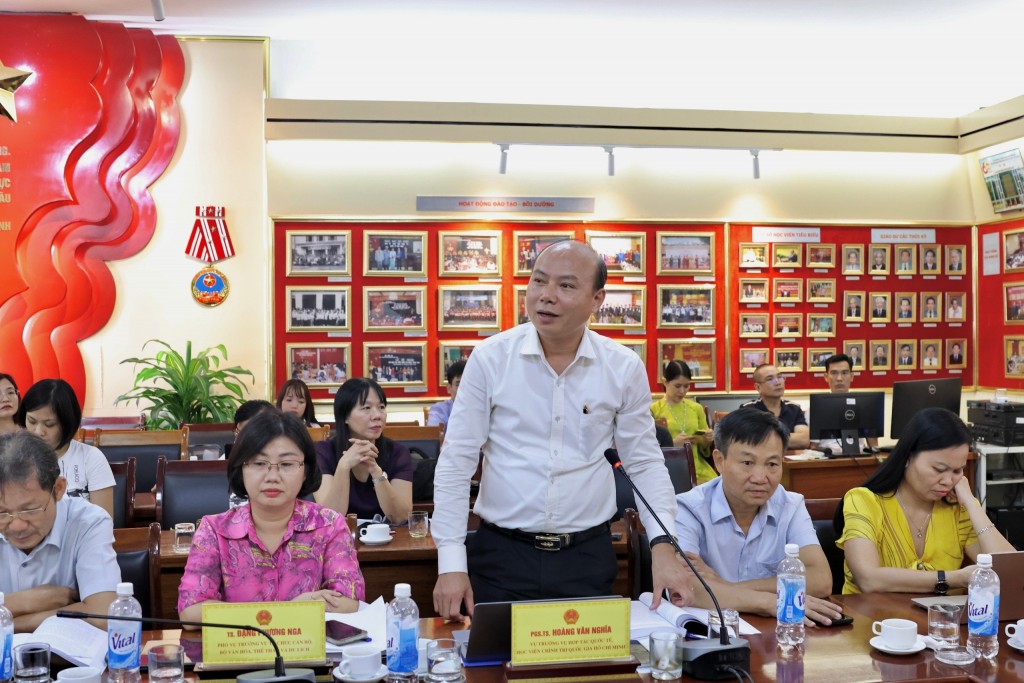
Assoc. Prof. Dr. Hoang Van Nghia, General Director of the International Cooperation Department, HCMA, at the workshop.
Assoc. Prof. Dr. Hoang Van Nghia, General Director of the International Cooperation Department, HCMA, presented a paper titled “Attracting High-Quality Human Resources in the Public Sector: International Experience and Policy Implications for Viet Nam”. Drawing on the analysis of high-quality human resource attraction policies in Singapore, South Korea, and Japan, he suggested several solutions for Viet Nam, including: (1) Changing the Mindset on Training, Recruitment, Utilization, and Compensation: Revising policies and practices related to training, recruitment, and compensation for civil servants and public sector personnel; (2) Amending and Enacting New Laws and Policies: Introducing new laws and regulations concerning training, recruitment, and compensation to align with modern needs; (3) Reforming the Evaluation System: Implement a merit-based ranking and evaluation system that emphasizes achievements and talents; (4) Building an International Standard Ethical Foundation for Civil Servants: Establishing a modern, nationally distinct ethical framework for civil servants that competes with other sectors (private, international, etc.); (5) Ensuring Objective, Independent, Fair, and Consistent Recruitment: Focusing on training, particularly in knowledge, skills, experience, and public service ethics.
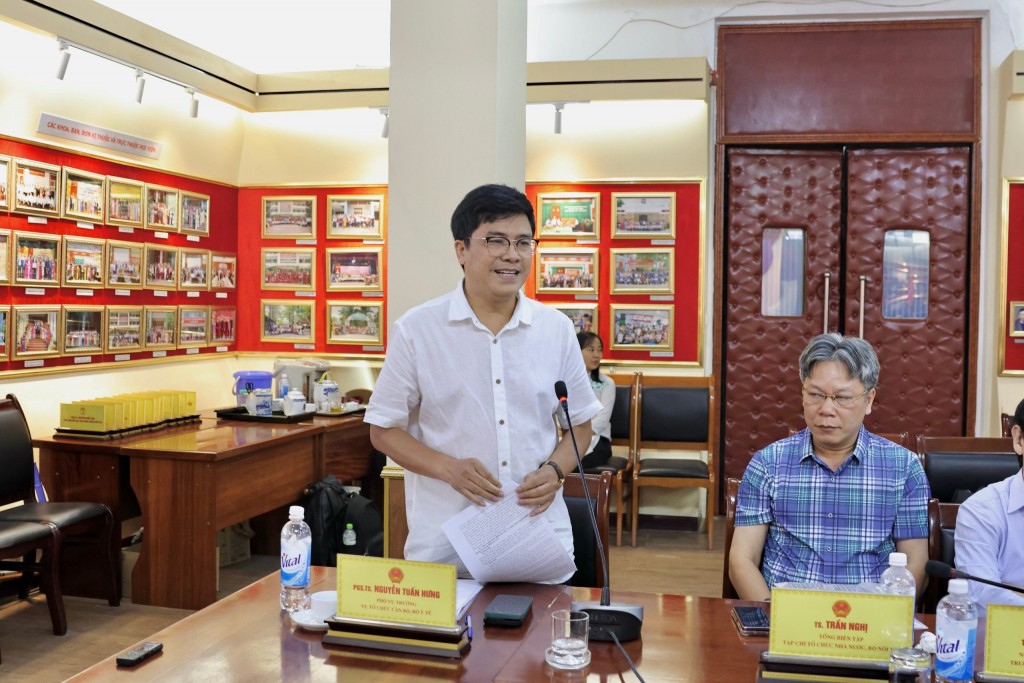
Assoc. Prof. Dr. Nguyen Tuan Hung, Deputy Director General of the Department of Organization and Personnel, Ministry of Health, at the workshop.
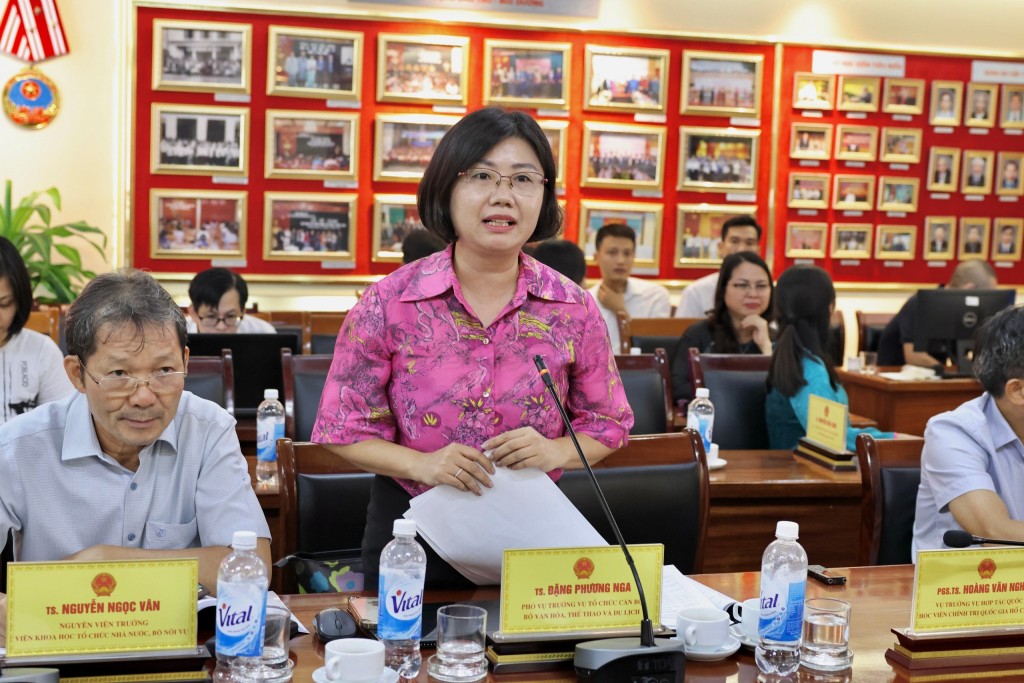
Dr. Dang Phuong Nga, Deputy Director General of the Department of Organization and Personnel, Ministry of Culture, Sports, and Tourism, at the workshop.
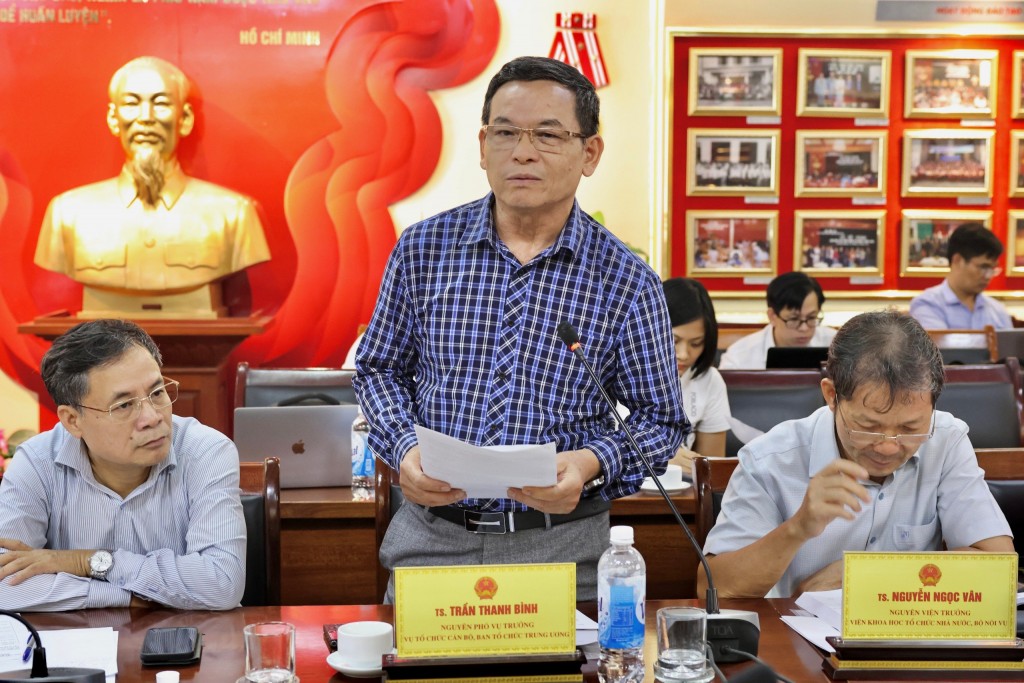
Dr. Tran Thanh Binh, former Deputy Director General of the Department of Organization and Personnel, Central Party Commission for Organization.
The workshop also featured insights from various delegates, experts, and scholars on attracting and utilizing talent in the public sector. The discussions focused on several key areas: (1) To attract talent, it is essential to improve the working environment, avoiding bureaucratic constraints that stifle creativity and allow talented individuals to flourish; (2) The criteria for talent should not be rigidly defined, as this could exclude talented individuals from the private sector; (3) The criteria for identifying talent should vary between central and local levels, and should also be tailored to the specific characteristics of each industry, profession, or field; (4) There is a need for legislation specifically addressing talent management; (5) Attracting talent should not rely solely on formal qualifications (such as excellence, honors degrees, PhDs, associate professorships, professorships) but should also consider actual abilities, as demonstrated by tangible outputs and job performance.
In addition to domestic policy discussions on attracting and utilizing talent, the workshop also included insights from international scholars on how various countries manage and retain talent.
In his concluding remarks, Assoc. Prof. Dr. Nguyen Ba Chien, NAPA President, expressed sincere thanks to the 44 authors who submitted papers, as well as the 11 direct contributors at the workshop. The Organizing Committee appreciates and takes into consideration the comments made by the delegates.
The workshop on “Attracting and Utilizing Talent in the Public Sector” achieved its objectives. Firstly, it helped to disseminate and promote policies on attracting and utilizing talent. Secondly, it provided NAPA with insights to improve research and teaching. The NAPA’s future task is to use training and policy education to address practical issues. Thirdly, the workshop provided a partial scientific basis for policy advice, with a need for more specific policy recommendations. The workshop aimed to clarify the definition of talent, distinguishing it from those who are merely capable or have potential. The XIII National Party Congress document identified a strategic breakthrough in human resource development, focusing on high-quality human resources. Attracting and utilizing talent is a key part of this high-quality human resource strategy. Broadly defining talent can place undue pressure on those being attracted. The draft decree currently focuses on attracting capable individuals. However, there are many barriers to attracting talent, such as institutional, income, and environmental factors. Addressing these barriers may require regulations beyond the scope of a decree. Therefore, a higher-level legal framework is necessary to effectively attract and utilize talent. The Prime Minister’s decision calls for strong, breakthrough solutions, particularly in terms of legal measures. The issues of attracting and utilizing talent are complex, with procedures remaining cumbersome. The Organizing Committee is committed to seriously considering, researching, and proposing solutions and recommendations to better support teaching, scientific research, and the training of lecturers, officials, and public employees at NAPA. Additionally, the findings will serve as valuable references for policy consultation and advice on attracting and utilizing talent in the new context of Viet Nam.



